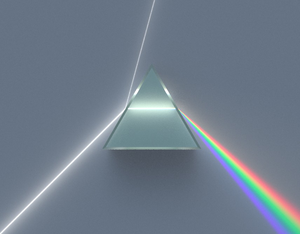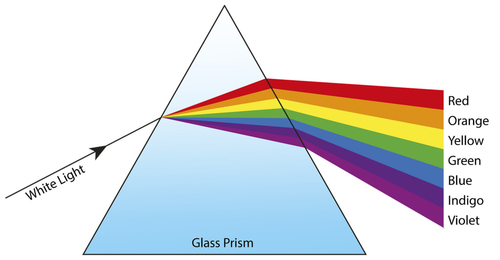Difference between revisions of "Prism (Physics)"
| Line 30: | Line 30: | ||
===About Prisms=== | ===About Prisms=== | ||
: '''Prisms''' show how white [[light]] is made of many different [[colour]]s. | : '''Prisms''' show how white [[light]] is made of many different [[colour]]s. | ||
| + | : '''Prisms''' can be used in [[spectroscope]] to perform a [[chemical]] analysis. | ||
: The different colours all [[refraction|refract]] by a different amount, causing them to split. | : The different colours all [[refraction|refract]] by a different amount, causing them to split. | ||
When [[White Light|white light]] enters a '''prism''' it is split into a [[spectrum]] of 7 [[colour]]s: | When [[White Light|white light]] enters a '''prism''' it is split into a [[spectrum]] of 7 [[colour]]s: | ||
Revision as of 09:17, 4 April 2019
Key Stage 3
Meaning
A prism is a transparent solid block with a triangular base.
About Prisms
- Prisms show how white light is made of many different colours.
- The different colours all refract by a different amount, causing them to split.
When white light enters a prism it is split into a spectrum of 7 colours:
- Red
- Orange
- Yellow
- Green
- Blue
- Indigo
- Violet
| A diagram of a prism showing how white light is made of the 7 colours of the spectrum. |
Key Stage 4
Meaning
A prism is a transparent solid block with a triangular base.
About Prisms
- Prisms show how white light is made of many different colours.
- Prisms can be used in spectroscope to perform a chemical analysis.
- The different colours all refract by a different amount, causing them to split.
When white light enters a prism it is split into a spectrum of 7 colours:
- Red
- Orange
- Yellow
- Green
- Blue
- Indigo
- Violet
| A diagram of a prism showing how white light is made of the 7 colours of the spectrum. |

